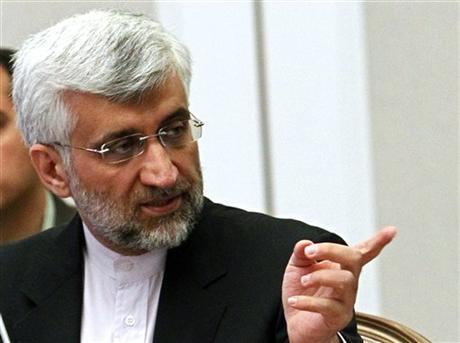Iran Analysis: What Tehran's Nuclear Negotiator Actually Said About the Talks (Paraszczuk)
 On Wednesday, a press conference by Iran's chief negotiator Saeed Jalili set much of the tone of Western coverage of the two-day nuclear talks between the Islamic Republic and the 5+1 Powers (US, Britain, France, Germany, Russia, and China). In particular, the accounts, emphasising Jalili's presentation of "positive" discussions, pointed to a breakthrough on issues that had stalemated negotiations for months.
On Wednesday, a press conference by Iran's chief negotiator Saeed Jalili set much of the tone of Western coverage of the two-day nuclear talks between the Islamic Republic and the 5+1 Powers (US, Britain, France, Germany, Russia, and China). In particular, the accounts, emphasising Jalili's presentation of "positive" discussions, pointed to a breakthrough on issues that had stalemated negotiations for months.
While this was part of Jaili's statement, he offered much more than this. Indeed, "positive" has to be put in the context of clear cautions from Jalili, the Secretary of the National Security Council, that the US and Europe will have to put more on the table regarding Iran's right to enrichment, guarantee of a supply fo 20% uranium, and sanctions relief.
Joanna Paraszczuk translates key extracts from the press conference and offers an annotated analysis:
"We consider it positive that the outlook of the 5+1 has gotten close to that of Iran."
The general statement of progress.
"Those who maintained the crippling sanctions imposed on our people in those 8 months [since the last high-level talks since Moscow] of the greatest pressure have acted against our nation. We saw that these pressures and behaviors have not only borne any results for them but have strengthened our determination to continue on our path; therefore the best way is to correct this strategy and to set out on a new path.
The West should abandon its hostile behaviors against Iran."
Sanctions have not worked and have only made Iran more resolute to continue with its nuclear programme; therefore, the West must amend its strategy:
"One of the arguments raised was that every proposal that was tabled -- to build transparency or to build confidence -- should be based on the rights of the IRI [Islamic Republic of Iran], the IRI's nuclear rights including the right to enrich uranium.
It is in this context that the issues may be negotiated. We also made this proposal in Moscow. One of the points made in our Moscow proposal was that Iran is ready to take the steps for cooperation."
We will work with you, but recognition of our right to enrich uranium must be explicitly recognised.
"One of the steps [toward] collaboration was something we raised three years ago in Geneva, that the Tehran reactor requires the 20% fuel which at that time we did not have, and we announced that we were willing to cooperate to obtain that fuel. Unfortunately, there was no response and [so] we produced that fuel ourselves."
If we are to suspend enrichment of 20% uranium, you must guarantee that you will provide us with the supply for our Tehran Research Reactor for civilian uses.
If you will not make that guarantee, we will continue with our 20% enrichment.
"The 5+1 came to the conclusion that their approach should be changed."
The US and European powers, in particular, acknowledged some of our demands and our proposal for a "step-by-step" approach.
"During the talks no proposal was made that we close Fordoo [enrichment plant."
And we are not going to do so.
"We are continuing to enrich based on our needs, whether that is 5% or whether that is 20%, but on the issue of cooperation in this area....Today, after eight months, they concluded that they need to take realistic steps to define that [i.e. cooperation] in order to approach Iran."
You have finally moved away from our unreasonable proposals to us from last year....
"We know our rights regarding enrichment. Iran's proposal in Moscow ----which was reported in the media and on the internet --- consisted of 5 major points, including that Iran's right to enrich uranium be respected as a legal right and that it be recognized; at the same time as we made a serious expression of our opposition to weapons of mass destruction."
...but you need to go farther, trusting that we are not deceiving you with pursuit of a military programme.
"When we did not have uranium enriched to 20%, we informed the world of that fact through the IAEA and even via the 5+1, because what was important to us was that we could produce 20% fuel for medicinal purposes, but they did not give us the fuel, and [so] we ensured that we had it, and we were well aware of our rights, and today also we know that it is our right to carry out this enrichment. We apply this right according to our needs […] and enrichment is carried out in this context".
Acknowledge our right to enrichment, and we will work with the International Atomic Energy Agency on inspections and safeguards.
But do not expect us to proceed if you will not acknowledge that right.

 Thursday, February 28, 2013 at 12:00
Thursday, February 28, 2013 at 12:00
Reader Comments